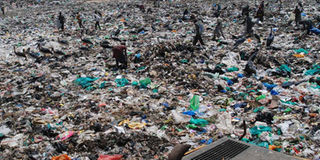The army taking risks to keep garbage where it belongs

Waste pickers at Dandora dumpsite on June 8, 2013. And although their jobs come at a great cost for those involved, their work remains unrecognised. PHOTO | NATION MEDIA GROUP
What you need to know:
- A UN Habitat publication says waste pickers perform between 50 to 100 per cent of all ongoing waste collection tasks.
- Their work improves sanitation besides improving public health and environmental aesthetics.
When dawn breaks, tens of women walk through Nairobi’s Eastland neighbourhood to the hilly mounds of freshly discarded garbage bags laying at the estates’ backyards.
The garbage sites, which are a temporary aggregation centre for the waste-bags collected from the neighbourhood, only holds the bags for less than half-a-day before they are hauled by garbage trucks to the city’s dumpsite in Dandora.
Once at the aggregation centre, the women split themselves into smaller groups of five or less before walking into nearby food kiosks, which act as their dressing rooms where they don work clothes.
From here, they proceed to the garbage site, where they must mine the dozens of bags with bare hands, in search for valuable items that they can resell, often for a pittance.
JOBS
Regina Ndinda has been a waste picker for three years.
Ndinda, 32, says she ekes out a living by scavenging through the garbage and salvaging whatever can be sold as scrap metal, recyclable material or pigs’ food.
“We sort the contents of the bags, separating the plastics and other materials from kitchen left-overs, she says.
Stella Wairimu is also another waste picker.
Unlike the less experienced Ndinda, Wairimu has been a waste picker for over 10 years.
TABLE BANKING
Through the job, she has educated her two children up to secondary school and also manages to pay her rent.
Wairimu says she and a few other waste pickers formed a table banking group through which they save a portion of each day’s earnings.
On a normal day, each one can make about Sh200.
As the waste pickers effortlessly dig through the garbage bags, a sordid stench of decomposing kitchen left-overs rent the air, yet, the women comfortably proceed with their work unperturbed.
PROTECTIVE GEAR
During the sorting, the women said, they put every material on its own heap.
“What is ours here are the food left-overs, which we sell to pig farmers. The others, like plastics, have their own handlers,” Wairimu says.
According to her, it is preferable to use bare hands when doing the work.
“That way, it is easier to sense any foreign materials.”
She recounts how her finger was once pierced by a glass shard yet she had been wearing gloves.
From then on, she stopped wearing them. So did the other women who work alongside her.
NHIF
Each day after work they wash their hands with antiseptic soaps and that is how they beat bacterial infections.
However, none has medical cover and have to pay their bills when they contract the illnesses they pick up while sorting through other people’s trash.
Clearly, news of the benefits of the National Hospital Insurance Fund are yet to reach Wairimu and others like her.
A visit to most garbage collection sites in Umoja as well as the Dandora dumpsite, reveals that indeed the waste pickers do not use hand gloves or any other gear that can protect them from toxins at the sites.
SANITATION
Despite the hazards that they face, their contribution to the environment is immeasurable.
A UN Habitat publication says waste pickers perform between 50 to 100 percent of all ongoing waste collection tasks in most cities in developing countries — a service for which they are not paid.
Their work improves sanitation besides improving public health and environmental aesthetics.
Mr Gerphas Opondo, the director of the Environmental Compliance Institute, says that waste pickers are critical to the country’s underdeveloped recycling system, making it easier for recyclers to thrive.
“All the waste generated in a Kenyan home or industry ends up in the same basket.
"These people are handy in the sorting out of the waste. Again recyclers of plastics, papers or metals do not have their people on the sites to do the sorting. Therefore, the pickers come in,” Mr Opondo says.
RECYCLING
Without waste pickers we would be having hills of unsightly garbage, some of which are plastics that take up to thousands of years to decompose.
According to Mr Evans Nagulu, a senior environmental chemist at the Kenya National Cleaner Production Centre, waste pickers are critical in reducing the waste burden from the environment besides giving a new life to the waste.
“When they set up the scraps for recycling they literally breathe a new life into them,” he says.
INFECTIONS
And although their jobs come at a great cost for those involved, their work remains unrecognised.
“Sometimes hazardous wastes and medical wastes from mushrooming health facilities find their way into the sites, which can be health threatening,” Mr Opondo says.
The waste pickers are also exposed to respiratory infections from smoke in the dump sites.
“Some of these people — especially those working in Dandora dumpsite — die prematurely due to respiratory ailments caused by carbon monoxide smoke among other contamination,” Mr Nagulu laments.





